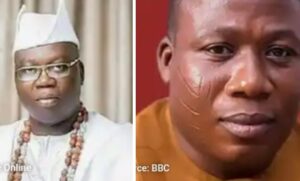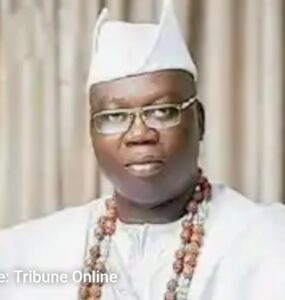Oyo Court Throws Out Gani Adams’ ₦5 Billion Defamation Lawsuit Against Sunday Igboho
Oyo Court Throws Out Gani Adams’ ₦5 Billion Defamation Lawsuit Against Sunday Igboho

In a significant legal development, the Oyo State High Court in Ibadan has dismissed a defamation lawsuit filed by Chief Gani Adams, the Aare Onakakanfo of Yorubaland, against prominent Yoruba activist Sunday Igboho. The suit, which sought ₦5 billion in damages, centered around allegations of a leaked private phone call.

Gani Adams
Background of the Case
Gani Adams had accused Igboho of unlawfully recording and distributing a confidential telephone conversation, which Adams argued infringed upon his right to privacy as guaranteed by Section 37 of the Nigerian Constitution. Represented by legal counsel Sikiru Akinrele, Adams demanded financial compensation and a formal declaration from the court affirming the violation of his personal rights.

Sunday Igboho
Igboho’s Response and Legal Strategy
During the proceedings on April 30, 2025, Igboho’s attorney, Junaid Sanusi, filed a counter-affidavit disputing the validity of Adams’ claims. Sanusi highlighted a procedural error—Adams himself had not sworn to the affidavit submitted with the case, nor had any authorized representative done so on his behalf, rendering the document legally inadequate.
Court Decision
On July 3, 2025, Justice O.T. Ademola-Salami delivered the ruling, striking out the case. The judge deemed the supporting affidavit “defective” due to its lack of proper authentication and further stated that no credible evidence had been presented to prove Igboho had recorded the call in question.
As part of the judgment, the court ordered Adams to pay ₦500,000 in legal costs to Igboho, effectively ending the high-profile case in the activist’s favor.
Wider Implications
This outcome is seen as a notable win for Sunday Igboho, whose outspoken activism continues to draw both praise and controversy. It also serves as a cautionary tale about the importance of adhering to legal protocols, particularly in matters involving claims of constitutional rights violations.
With tensions ongoing between traditional institutions and contemporary political figures in the South-West, the case is likely to influence broader conversations around privacy, digital conduct, and due process in Nigeria’s legal system.
TRENDING SONGS
 NPMA Appeals to Nigerian Government for Compensation After Lagos Market Fire
NPMA Appeals to Nigerian Government for Compensation After Lagos Market Fire
 Rest Every Four Hours, FRSC Issues Safety Guide for Fasting Motorists
Rest Every Four Hours, FRSC Issues Safety Guide for Fasting Motorists
 NNPC Boss Ojulari Bags UK Energy Institute Fellowship
NNPC Boss Ojulari Bags UK Energy Institute Fellowship
 Shock in Anambra: Bride Disappears Moments Before Wedding
Shock in Anambra: Bride Disappears Moments Before Wedding
 Nigerian Woman Returns ₦330 Million Accidentally Credited to Her Account
Nigerian Woman Returns ₦330 Million Accidentally Credited to Her Account
 APC Don Reach Morocco?’ VeryDarkMan Reacts to Seyi Tinubu Poster
APC Don Reach Morocco?’ VeryDarkMan Reacts to Seyi Tinubu Poster
 Bride Breaks Down in Tears as Wedding Meals Were Kept Secretly While Guests Go Home Hungry
Bride Breaks Down in Tears as Wedding Meals Were Kept Secretly While Guests Go Home Hungry
 Odogwu by Day, Robber by Night: How Marriage Joy Turned Into Tragedy
Odogwu by Day, Robber by Night: How Marriage Joy Turned Into Tragedy
 Nigerian Officials Allegedly Pocket N4–6B Weekly Through Smuggling Cartels at Seme–Badagry Border
Nigerian Officials Allegedly Pocket N4–6B Weekly Through Smuggling Cartels at Seme–Badagry Border
 Ahmad Yerima: Naval Officer to Face No Sanctions After Clash with Wike – Matawalle
Ahmad Yerima: Naval Officer to Face No Sanctions After Clash with Wike – Matawalle
Share this post with your friends on ![]()













